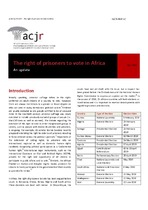| dc.contributor.author | Muntingh, Lukas | |
| dc.date.accessioned | 2019-12-05T13:34:12Z | |
| dc.date.available | 2019-12-05T13:34:12Z | |
| dc.date.issued | 2019 | |
| dc.identifier.citation | Muntingh, L. (2019). 'The right of prisoners to vote in Africa: An update ' . Africa Criminal Justice Reform, University of the Western Cape | en_US |
| dc.identifier.uri | http://hdl.handle.net/10566/5106 | |
| dc.description.abstract | Broadly speaking, universal suffrage refers to the rights conferred on adult citizens of a country to vote, however, there are always restrictions to a greater or lesser degree on who can vote in every democratic political system. Children are usually excluded as are people certified to be of unsound mind. In the twentieth century universal suffrage was slowly extended to include previously excluded groups of people (i.e. black/Africans as well as women). The debate regarding the extension of the right to vote to other marginalized groups in
society, such as people with mental disabilities and prisoners, is on-going. For example, US senator Bernie Sanders recently proposed extending the right to vote to all prisoners resulting in fierce criticism across the political spectrum. Proponents of the extension of voting rights to prisoners rely on international, regional as well as domestic human rights standards recognising political participation as a fundamental human right. | en_US |
| dc.language.iso | en | en_US |
| dc.publisher | Africa Criminal Justice Reform | en_US |
| dc.subject | Prisoners’ rights to vote | en_US |
| dc.subject | Electoral laws | en_US |
| dc.subject | South Africa | en_US |
| dc.subject | Ghana | en_US |
| dc.title | The right of prisoners to vote in Africa: An update | en_US |
| dc.type | Article | en_US |

